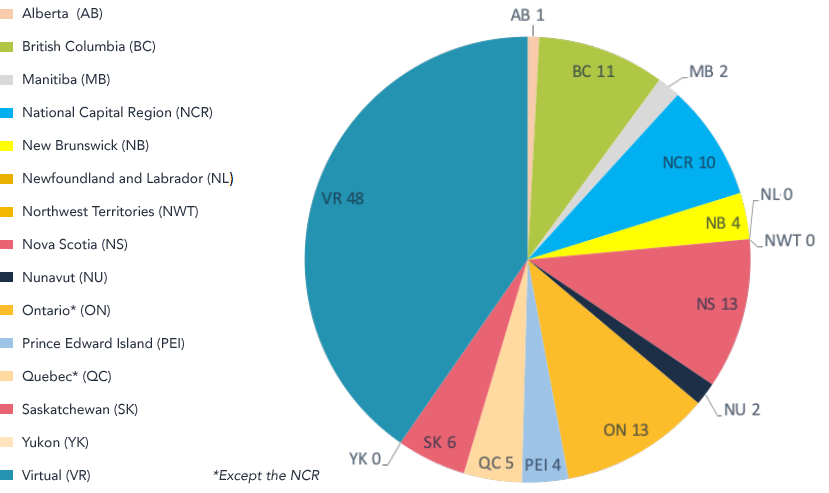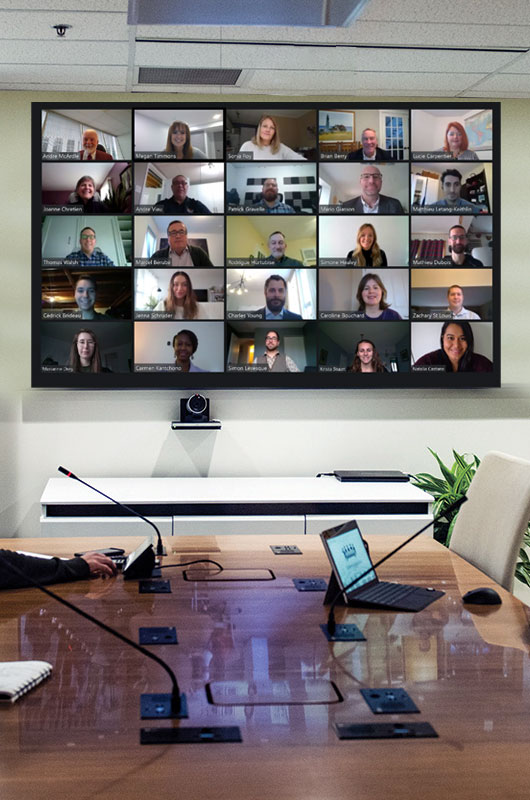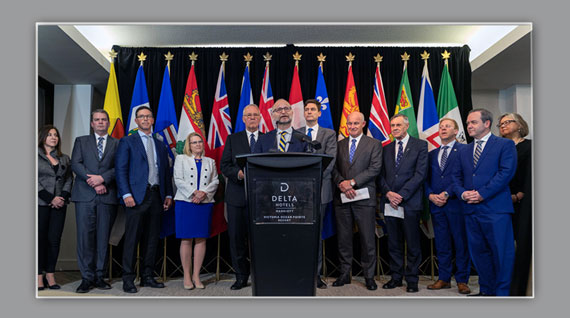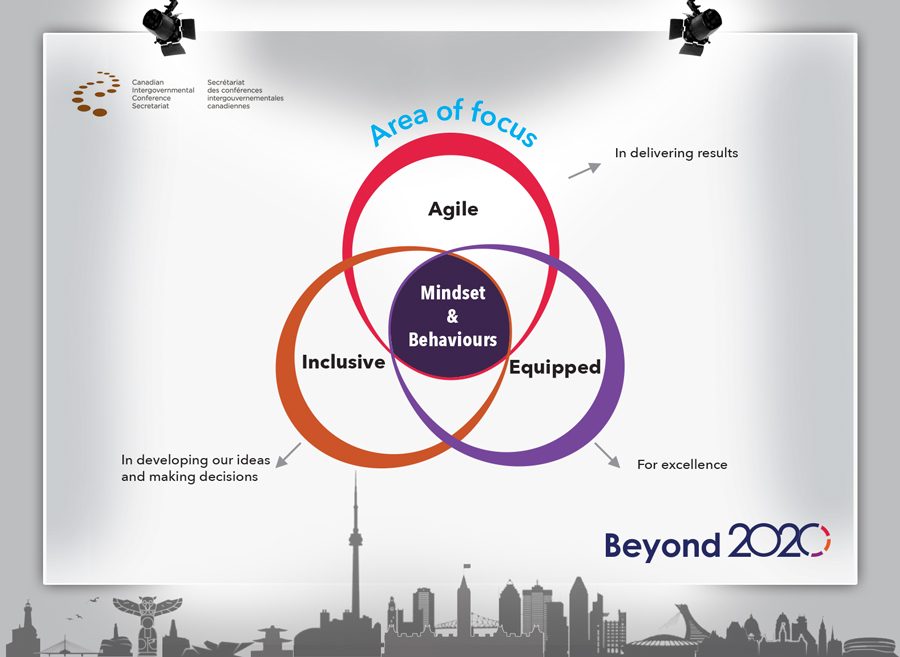Federal-Provincial-Territorial
89Overview of intergovernmental conference activity in 2019-20.
Federal-Provincial-Territorial
89In-person
71Provincial-Territorial
30Teleconference
48
| SECTOR | LEVEL | TYPE | FORMAT | LOCATION | MONTH |
|---|---|---|---|---|---|
| Child and Youth Advocates | Deputy Ministers | PT | In-person | Quebec | E May |
| Agriculture | Ministers | PT | In-person | Quebec | G July |
| Agriculture | Ministers | FPT | In-person | Quebec | G July |
| Public Works | Deputy Ministers | FPT | In-person | Quebec | I September |
| Justice and Public Safety | Deputy Ministers | FPT | In-person | Quebec | L December |
| Justice and Public Safety | Deputy Ministers | PT | In-person | Prince Edward Island | E May |
| Seniors | Ministers | FPT | In-person | Prince Edward Island | E May |
| Justice and Public Safety | Deputy Ministers | FPT | In-person | Prince Edward Island | E May |
| Information and Privacy Commissioners | Deputy Ministers | FPT | In-person | Prince Edward Island | J October |
| Energy and Mines | Deputy Ministers | FPT | In-person | British Columbia | E May |
| Status of Women | Ministers | FPT | In-person | British Columbia | F June |
| Energy and Mines | Ministers | FPT | In-person | British Columbia | G July |
| Education | Deputy Ministers | PT | In-person | British Columbia | G July |
| Education | Ministers | PT | In-person | British Columbia | G July |
| Status of Women | Ministers | FPT | In-person | British Columbia | L December |
| Status of Women | Ministers | FPT | In-person | British Columbia | L December |
| Status of Women | Deputy Ministers | FPT | In-person | British Columbia | L December |
| Social Services | Deputy Ministers | PT | In-person | British Columbia | G July |
| Social Services | Deputy Ministers | PT | In-person | British Columbia | L December |
| Justice and Public Safety | Ministers | FPT | In-person | British Columbia | A January |
| Tourism | Deputy Ministers | FPT | Teleconference | Virtual | D April |
| Social Services | Deputy Ministers | PT | Teleconference | Virtual | D April |
| Social Services | Deputy Ministers | FPT | Teleconference | Virtual | D April |
| Sport, Physical Activity and Recreation | Deputy Ministers | FPT | Teleconference | Virtual | D April |
| Transportation | Deputy Ministers | FPT | Teleconference | Virtual | D April |
| Education | Deputy Ministers | PT | Teleconference | Virtual | D April |
| Seniors | Deputy Ministers | FPT | Teleconference | Virtual | D April |
| Status of Women | Senior Officials | FPT | Teleconference | Virtual | D April |
| Culture and Heritage | Deputy Ministers | PT | Teleconference | Virtual | E May |
| Culture and Heritage | Deputy Ministers | FPT | Teleconference | Virtual | E May |
| Infrastructure | Ministers | FPT | Teleconference | Virtual | F June |
| Broadband | Ministers | FPT | Teleconference | Virtual | F June |
| Forests | Deputy Ministers | FPT | Teleconference | Virtual | G July |
| Status of Women | Deputy Ministers | FPT | Teleconference | Virtual | G July |
| Housing | Deputy Ministers | PT | Teleconference | Virtual | H August |
| Housing | Deputy Ministers | FPT | Teleconference | Virtual | H August |
| Culture and Heritage | Deputy Ministers | FPT | Teleconference | Virtual | I September |
| Social Services | Deputy Ministers | PT | Teleconference | Virtual | I September |
| Status of Women | Deputy Ministers | FPT | Teleconference | Virtual | J October |
| Status of Women | Deputy Ministers | FPT | Teleconference | Virtual | J October |
| Status of Women | Senior Officials | FPT | Teleconference | Virtual | J October |
| Service Delivery Collaboration | Deputy Ministers | FPT | Teleconference | Virtual | J October |
| Justice and Public Safety | Deputy Ministers | FPT | Teleconference | Virtual | K November |
| Labour | Deputy Ministers | FPT | Teleconference | Virtual | K November |
| Status of Women | Senior Officials | FPT | Teleconference | Virtual | K November |
| Sport, Physical Activity and Recreation | Deputy Ministers | FPT | Teleconference | Virtual | K November |
| Status of Women | Senior Officials | FPT | Teleconference | Virtual | K November |
| Social Services | Deputy Ministers | PT | Teleconference | Virtual | K November |
| Service Delivery Collaboration | Deputy Ministers | FPT | Teleconference | Virtual | L December |
| Social Services | Ministers | PT | Teleconference | Virtual | A January |
| Early Learning and Child Care | Ministers | FPT | Teleconference | Virtual | A January |
| Public Trustees | Deputy Ministers | FPT | Teleconference | Virtual | A January |
| Forest | Deputy Ministers | FPT | Teleconference | Virtual | B February |
| Public Trustees | Deputy Ministers | PT | Teleconference | Virtual | B February |
| Sport, Physical Activity and Recreation | Deputy Ministers | FPT | Teleconference | Virtual | B February |
| Culture and Heritage | Deputy Ministers | FPT | Teleconference | Virtual | B February |
| Culture and Heritage | Deputy Ministers | PT | Teleconference | Virtual | B February |
| Status of Women | Senior Officials | FPT | Teleconference | Virtual | B February |
| Service Delivery Collaboration | Deputy Ministers | FPT | Teleconference | Virtual | C March |
| Tourism | Ministers | FPT | Teleconference | Virtual | C March |
| Housing | Deputy Ministers | FPT | Teleconference | Virtual | C March |
| Fisheries and Aquaculture | Deputy Ministers | FP | Teleconference | Virtual | C March |
| Immigration | Deputy Ministers | FPT | Teleconference | Virtual | C March |
| Labour | Ministers | FPT | Teleconference | Virtual | C March |
| Tourism | Ministers | FPT | Teleconference | Virtual | C March |
| Fisheries and Aquaculture | Ministers | FP | Teleconference | Virtual | C March |
| Culture and Heritage | Ministers | FPT | Teleconference | Virtual | C March |
| Public Works | Deputy Ministers | FPT | Teleconference | Virtual | C March |
| Public Service Commissioners | Deputy Ministers | FPT | In-person | Manitoba | I September |
| Child and Youth Advocates | Deputy Ministers | PT | In-person | Manitoba | I September |
| Fisheries and Aquaculture | Deputy Ministers | FPT | In-person | Saskatchewan | D April |
| Social Services | Ministers | FPT | In-person | Saskatchewan | D April |
| Social Services | Ministers | PT | In-person | Saskatchewan | D April |
| Social Services | Ministers | PT | In-person | Saskatchewan | D April |
| Forest | Ministers | FPT | In-person | Saskatchewan | H August |
| Social Services | Deputy Ministers | PT | In-person | Saskatchewan | J October |
| Chief Coroners and Medical Examiners | Deputy Ministers | PT | In-person | New Brunswick | F June |
| Election Officials/Electoral Partners | Deputy Ministers | FPT | In-person | New Brunswick | G July |
| Election Officials/Electoral Partners | Deputy Ministers | FPT | In-person | New Brunswick | G July |
| Labour | Ministers | FPT | In-person | New Brunswick | B February |
| Western Premiers' Conference | Premiers | PT | In-person | Alberta | F June |
| Clerks and Cabinet Secretaries | Deputy Ministers | FPT | In-person | Ontario | D April |
| Innovation and Economic Development | Deputy Ministers | FPT | In-person | Ontario | E May |
| Public Trustees | Deputy Ministers | FPT | In-person | Ontario | E May |
| Tourism | Deputy Ministers | FPT | In-person | Ontario | E May |
| Governor General, Lieutenant Governors and Territorial Commissioners | Vice-Regal | FPT | In-person | Ontario | F June |
| Education | Deputy Ministers | PT | In-person | Ontario | L December |
| Education | Deputy Ministers | PT | In-person | Ontario | L December |
| Education | Deputy Ministers | PT | In-person | Ontario | L December |
| Intergovernmental Affairs | Deputy Ministers | FPT | In-person | Ontario | A January |
| Child and Youth Advocates | Deputy Ministers | PT | In-person | Ontario | A January |
| Transportation | Ministers | FPT | In-person | Ontario | B February |
| Transportation | Ministers | FPT | In-person | Ontario | B February |
| Intergovernmental Affairs | Deputy Ministers | FPT | In-person | Ontario | B February |
| Local Government | Deputy Ministers | PT | In-person | Nova Scotia | F June |
| Local Government | Ministers | PT | In-person | Nova Scotia | F June |
| Tourism | Ministers | FPT | In-person | Nova Scotia | F June |
| Culture and Heritage | Ministers | PT | In-person | Nova Scotia | F June |
| Culture and Heritage | Deputy Ministers | FPT | In-person | Nova Scotia | F June |
| Culture and Heritage | Ministers | FPT | In-person | Nova Scotia | F June |
| Culture and Heritage | Deputy Ministers | PT | In-person | Nova Scotia | F June |
| Culture and Heritage | Ministers | FPT | In-person | Nova Scotia | F June |
| Service Delivery Collaboration | Deputy Ministers | FPT | In-person | Nova Scotia | F June |
| Environment | Deputy Ministers | FPT | In-person | Nova Scotia | F June |
| Transportation | Senior Officials | FPT | In-person | Nova Scotia | I September |
| Transportation | Deputy Ministers | FPT | In-person | Nova Scotia | I September |
| Fisheries and Aquaculture | Ministers | FPT | In-person | Nova Scotia | A January |
| Francophonie | Ministers | PT | In-person | Nunavut | FJune |
| Francophonie | Ministers | FPT | In-person | Nunavut | FJune |
| Forest | Deputy Ministers | FPT | In-person | NCR | D April |
| Labour | Deputy Ministers | FPT | In-person | NCR | E May |
| Status of Women | Senior Officials | FPT | In-person | NCR | E May |
| Conservation, Wildlife and Biodiversity | Deputy Ministers | FPT | In-person | NCR | F June |
| Conservation, Wildlife and Biodiversity | Deputy Ministers | FPT | In-person | NCR | F June |
| Infrastructure | Deputy Ministers | FPT | In-person | NCR | H August |
| Agriculture | Ministers | FPT | In-person | NCR | L December |
| Early Learning and Child Care | Ministers | FPT | In-person | NCR | A January |
| Conservation, Wildlife and Biodiversity | Deputy Ministers | FPT | In-person | NCR | B February |
| Election Officials/Electoral Partners | Deputy Ministers | FPT | In-person | NCR | A January |
The Canadian Intergovernmental Conference Secretariat (CICS) is an impartial agency whose mandate is to provide administrative support and planning services for federal-provincial-territorial and provincial-territorial conferences of first ministers, ministers and deputy ministers, throughout Canada.
Our primary objective is to relieve client departments of the numerous technical and administrative tasks associated with the planning and conducting of multilateral conferences, thereby enabling participants to concentrate on substantive intergovernmental policy issues.
The Secretariat’s services are available to federal, provincial and territorial government departments that are called upon to organize and chair such meetings.
Being truly intergovernmental in nature, the agency is funded by the federal and provincial governments, and its staff is comprised of federal, provincial and territorial public servants.
We thrive on helping governments by delivering impartial and professional conference services, with innovative solutions.
Working together to make it happen.
Excellence
We strive to fulfill the requirements of our mandate through teamwork.
Respect
We offer a collegial and rewarding work environment that fosters trust, civility, dignity and fairness.
Integrity
We conduct ourselves in an ethical, honest and transparent manner and with financial probity.
Serves as the executive office of CICS. Its function is to provide support to the Secretary in his day-to-day activities as the deputy head of the agency.
Responsible for information management, information technology and library services to the organization. It also maintains a permanent archive of audio-visual records, documents and a selection of photographs from various conferences served by CICS.
Delivers the agency’s core mandate by providing support and advice to the Chair and Co-Chairs with respect to the planning, organizing and the logistics management of senior level intergovernmental conferences.
Conference Services personnel are a mix of federal, provincial and/or territorial government employees. Additional personnel such as interpreters, translators, technicians and security guards are contracted to join the teams at each conference site, as required.
Responsible for the agency’s financial, human resources, procurement and security services. This includes providing functional direction and guidance to managers and staff in the delivery of conference services.
Our executive team is experienced and committed to delivering innovative conference solutions. Working together, they are focused on excellence in client service and achieving value-for-money for all stakeholders.
From left to right: André M. McArdle, Secretary; Mario Giasson, Director, Information Services; Rodrigue Hurtubise, Director, Conference Services; Charles Young, Director, Corporate Services; Brian J. Berry, Assistant Secretary

In early 2020, Charles Young joined CICS as the Director of Corporate Services and Deputy Chief Financial Officer. Charles holds a Bachelor of Arts in Economics from Carleton University and is also a Chartered Professional Accountant (CPA). With 10 years of experience in the federal government, most recently at the Treasury Board of Canada Secretariat, Charles is a welcome and valued addition to the team.
If you've attended an intergovernmental meeting, you may have had the pleasure to meet one of our employees. They are greeting you at the registration desk, providing technical support in the meeting room, or offering a wide variety of other administrative support services from our satellite office on site. The Canadian Intergovernmental Conference Secretariat (CICS) team is made up of Conference Administrative Officers and Conference and Procurement Technical Services Officers, who work diligently with their Conference Manager and conference organizers to provide a seamless and successful event.
As a client-focused organization with only 32 FTEs, almost all of CICS’s employees are trained to serve conferences during peak periods. Our vision “Working together to make it happen” describes our work ethic perfectly: dedicated teamwork helps us achieve the success of your event. Our employees are motivated, dedicated, and proud of the work they do. They are vibrant and creative, and are always proactively discovering the latest technologies to improve services provided both internally and to our clients.
The Mental Health Policy is regularly reviewed to ensure it is relevant for employees today; group activities such as yoga and mindfulness sessions are just some of the ways we connect and reenergize. We invest in the well-being of our employees, as well as in their training at both an individual and a corporate level. Continuous learning opportunities are offered to ensure we stay on top of current trends, and to provide advancement opportunities within our agency. Much work is done behind the scenes to ensure well-organized and efficient senior-level intergovernmental meetings. We wouldn’t have been able to achieve all that we have this year without our caring and competent employees.
CICS Staff Photo

The Secretary’s award of excellence is given annually for exceptional contributions made by the agency’s employees to the Secretariat’s efficient operations. Among the criteria utilized to receive this award are excellence of work on special projects or major initiatives, exemplary behavior and ultimately, the positive results achieved. The successful candidate for this award in 2019 was Simone Healey.
The Employee’s Choice Award is given once a year by a vote of all employees to an individual who exemplifies the criteria of the theme announced. This year’s theme was “Teamwork”. Throughout the year, Natalia Castano demonstrated an eagerness to help her co-workers at all possible opportunities. Natalia is most often the first volunteer to collaborate on projects, special events, and committees. For this reason, employees voted for her to receive the 2019 Employees' Choice Award.
In addition to these two major awards, we also recognize Long Service (three recipients in 2019-20: André Viau, Sonia Roy, Simon Lévesque) and those going above and beyond receive Instant Awards (seven recipients in 2019-20: Caroline Régimbald, Cédrick Brideau, Marie-Pier Boivin, Matthieu Letang-Keithlin, Thomas Walsh, Lessia Harvey x 2).

Employee’s Choice Award Winner: Natalia Castano, Conference Administrative Officer

Secretary’s Award Winner: Simone Healey, A/Conference Manager
A number of positions in the Conference Services division are reserved for provincial and territorial (PT) public servants who are seconded to the agency from their respective governments. CICS offers these employees a unique developmental opportunity in the field of intergovernmental affairs; the secondments are usually three-year terms. The presence of our provincial and territorial government colleagues helps ensure that CICS can fulfill its mandate as a neutral intergovernmental body, and also boost the organization’s knowledge of provincial and territorial governments. Upon completion of their secondment, the PT employees return to their respective governments enriched with the experience of working with key sectors of intergovernmental activity at the most senior levels.
The Federal Student Work Experience Program (FSWEP) was crucial for student recruitment; the Secretariat had a total of nine (9) FSWEP actions in 2019-20. In an effort to increase interest among students, CICS employees attended Career Fairs at Algonquin College and Université du Québec en Outaouais (UQO). A booth was set-up with pamphlets, photos, and employees who spoke with students about working in the Federal Government. CICS’ students worked in various areas of the department such as Event Management, Finance, Conference Administration and Human Resources.
What we do
We offer logistical and administrative support services for senior-level intergovernmental conferences.
These services include conference registration, translation and distribution of documents, room set-up, audio-visual support, simultaneous interpretation and archiving.
Most, but not all, senior-level intergovernmental conferences are supported by our organization. Our client “sectors” include Health, Status of Women, Justice, Education and Intergovernmental Affairs, to name just a few.
The Secretariat ensures continuity and neutrality in the delivery of conference support services, while also offering innovative and resource-efficient solutions.

Minister of Public Safety and Solicitor General, Mike Farnworth, along with Attorney General, David Eby and federal colleagues Minister of Justice and Attorney General of Canada, David Lametti and Minister of Public Safety and Emergency Preparedness, Bill Blair host meeting of Justice and Public Safety Ministers from across the country, as well as representatives from the Assembly of First Nations and the Métis Nation, to work together on key justice and public safety issues of shared importance to Canadians.
Federal, provincial and territorial ministers responsible for justice and public safety meet in British Columbia to discuss key justice and public safety priorities.
First Ministers/ Premiers
Ministers
Deputy Ministers
Key Message
In 2019, CICS invested in updated equipment (i.e. Microsoft SurfacePro tablets) and improved software to become a completely remote workforce The Secretariat evolved its virtual conferencing technology, researched improvements for its in-house remote conferencing studio capabilities, and procured state of the art internet hubs to provide the best client service possible on conference sites. In addition to beginning research on remote interpretation, CICS also implemented digital signatures to decrease paper waste and help reduce its carbon footprint.
CICS’ Information Services branch implemented new tools to improve our Asset Management Tracking, and also a secure platform for internal communications. The Information Technology team was instrumental as challenges arose in teleconferencing, especially while the studio use was being heavily ramped up in the early months of 2020.
Stand-up meetings
These fast-paced half-hour meetings held every Monday were started in the Conference Services Division to give each team member a chance to update their colleagues on current workload, priorities and challenges. The meetings also provide an opportunity to share lessons learned, best practices and solutions to specific issues that can benefit the whole team and ensure a more cohesive and coordinated approach to supporting CICS clients.
Client guidance tools
Throughout 2019, CICS developed a pan-Canadian conference venue directory, a set of conference planning guides for clients, and an online calendar of CICS’ availability. These are important additions to the tools that will make the Agency even more effective in its support and guidance, especially during the early event planning stages.
Client newsletter
As part of efforts to improve information sharing and knowledge building with clients, CICS distributed in early January 2020 its first semi-annual newsletter to conference organizers and other stakeholders in all 14 client governments. This first issue talked about the upcoming Knowledge Exchange Forums, the new Pan-Canadian directory of meeting venues, and virtual conferencing.
New survey methodologies for clients
The surveys that assess client satisfaction were upgraded to maintain their relevance and better address certain service areas, while new surveys were developed for organizers and participants of virtual meetings, an area that has been steadily gaining in popularity over the past 5 years. Approaches to surveying were also modified, especially to simplify participation and therefore increase response rates.
Two surveys (one of an annual sampling of conference organizers and the other of delegates after each in-person event) are used to assess client satisfaction, which continues to be very high. It is important to note that with the development of new or upgraded surveys for meeting organizers in 2019-20, the comparison of results with those of previous years may not be entirely accurate.
Quick move to virtual conferencing
The move from in-person to virtual meetings during the last quarter of 2019-20, as a result of the growing COVID pandemic, became a complete shift after mid-March. CICS was able to react swiftly and seamlessly to the dramatic impacts of the pandemic on its operations, and maintain a high quality of support throughout. All the time and effort invested in the development and implementation of new technologies and processes in 2019 proved most auspicious in view of this complete shift towards virtual conferencing.
In spite of a 5% decrease in the total number of meetings served in comparison to the previous fiscal year, 2019-20 was still a very busy year at CICS in terms of conference activity. The 119 meetings served represented the fourth highest annual total in the past 15 years. While the number of in-person meetings served decreased by 13% (due in good part to the fall 2019 federal election), the number of teleconferences increased by 12% and represented a record 40% of all conferences served (a direct result of the onset of the COVID pandemic in early 2020, but also clients’ sustained interest in virtual conferencing as a viable, cost-and time-effective way for governments to confer).
Fiscal year 2019-20 also saw a continued trend towards web conferencing as another cost-effective way (along with teleconferencing) to involve some presenters and delegates whose brief participation in in-person meetings makes travel costs and time investments prohibitive.
Three of our top-level conferences did not go ahead this year due to various factors beyond the control of CICS. The annual First Ministers Meeting was postponed at the last minute due to the declaration of COVID-19 as a global pandemic; and the Eastern Canadian Premiers and New England Governors (ECP/NEG) conference was cancelled last minute due to inclement weather. Finally, the Atlantic Growth Strategy Committee meeting which was scheduled to take place in Newfoundland and Labrador during the second half of 2019 was not held following the Provincial election that took place in the spring.
Two surveys (one an annual sampling of conference organizers and the other of delegates who attended in-person events) are used to assess client satisfaction. Both provide valuable and very timely feedback on all aspects of the administrative and technical support CICS provides. In turn, this insight informs the Secretariat’s decisions about the alignment of its services and approaches with clients’ evolving needs and priorities.
Meeting organizers continued to favor CICS to help them plan and deliver their future meetings. The Secretariat’s ability to clearly and comprehensively identify conference logistical and protocol requirements showed the highest increase in client satisfaction in 2019-20. For teleconferences, the highest rating from organizers was obtained for the ability to listen to and understand the needs and requirements. Very high praise was also obtained once again regarding CICS staff’s and contractors’ courteousness, knowledge and responsiveness to participants’ needs during conferences, as well as CICS’ planning services having resulted in an effectively and efficiently run conference that met operational expectations.
Professionally planned and supported conferences, including effectively addressing unforeseen challenges.
Client (Conference Organizer) satisfaction levels for the full range of CICS services provided in support of PT and FPT conferences.
Clients' and conference participants' conference needs identified and addressed accordingly.
Client (Conference Participant) satisfaction levels for the full range of CICS services provided in support of PT and FPT conferences.
Online Registration and Document Retrieval
In relation to in-person meetings, clients continued to take advantage of the benefits and ease of use of our secure online registration service; it is also useful to host governments to gauge interest in, and plan for delegates’ participation in the various components of more elaborate conference programs in particular.
We had 71 in-person conferences in 2019-20, held within 60 events (sometimes there are two or even three conferences at one event). Of these 60 in-person events, 83% used the online registration, unchanged from the previous year.
For its part, the usage of online secure access to documents in the context of the same 60 events decreased to 32% (from 36% the previous year). This is due at least in part to the fact that more sectors now have a dedicated and secure intranet and/or document-sharing site for their members.
Percentage of in-person events that used the Secretariat’s secure online registration site and document portal:
Figures for virtual conferencing indicate the number of in-person meetings where either tele- or video-conference equipment was used to link-in remote participants or presenters.
*Figures for virtual conferencing in 2016-17 represent meetings held solely by videoconference.
As for level, the number of meetings of First Ministers/Premiers, Ministers and Deputy Ministers was 1, 35 and 75 respectively in 2019-20, compared to 5/46/66 in 2018–19 and 5/45/86 in 2017–18.
This shows a 14% increase in meeting activity at the Deputy Ministers level, but a 24% decrease in Ministers’ meetings compared to the two previous years.
Only one conference was served at the top level in 2019-20: the Western Premiers Conference. The others, including the First Ministers Meeting, the Atlantic Growth Strategy Committee, and the annual meeting of New England Governors and Eastern Canadian Premiers, were not held due to a number of factors beyond the control of CICS.
*does not include other levels of conferences
Looking at meeting type, CICS served a total of 89 FPT and 30 PT meetings in 2019–20, compared to 90 and 35 respectively during the previous fiscal year, and a 91/47 ratio in 2017–18. This indicates a stable number of FPT meetings over the past three years, but a 36% decline in the number of PT meetings.
Of the 36 sectors of intergovernmental activity served in 2019–20, the three that convened the most often (either in person or by teleconference) were Status of Women, Culture and Heritage, and Social Services. Together, these sectors were responsible for 29% of all meetings served by CICS.
Also of note was the support that CICS provided to the annual Western Premiers Conference held in Edmonton in June 2019, the Secretariat’s first involvement in this meeting in three years. This was the only meeting served at the First Ministers/Premiers level in all of 2019-20, while the annual meeting of New England Governors and Eastern Canadian Premiers (planned for Saint John, New Brunswick in September 2019) and a First Ministers Meeting (scheduled for Ottawa in mid-March 2020) were cancelled due to inclement weather and the COVID-19 pandemic, respectively.
| Sector | No. Conferences |
|---|---|
| Agriculture | 3 |
| Broadband | 1 |
| Chief Coroners and Medical Examiners | 1 |
| Child and Youth Advocates | 3 |
| Clerks and Cabinet Secretaries | 1 |
| Conservation, Wildlife and Biodiversity | 3 |
| Culture and Heritage | 11 |
| Early Learning and Child Care | 2 |
| Education | 6 |
| Election Officials/Electoral Partners | 3 |
| Energy and Mines | 2 |
| Environment | 1 |
| Fisheries and Aquaculture | 4 |
| Forest | 4 |
| Francophonie | 2 |
| Governor General, Lieutenant Governors and Territorial Commissioners | 1 |
| Housing | 3 |
| Immigration | 1 |
| Information and Privacy Commissioners | 1 |
| Infrastructure | 2 |
| Innovation and Economic Development | 1 |
| Intergovernmental Affairs | 2 |
| Justice and Public Safety | 5 |
| Labour | 4 |
| Local Government | 2 |
| Public Service Commissioners | 1 |
| Public Trustees | 3 |
| Public Works | 2 |
| Seniors | 2 |
| Service Delivery Collaboration | 4 |
| Social Services | 11 |
| Sport, Physical Activity and Recreation | 3 |
| Status of Women | 13 |
| Tourism | 5 |
| Transportation | 5 |
| Western Premiers' Conference | 1 |

Ministerial Conference on Canadian Francophonie
(Property of the Government of Nunavut)
Photo credit: Jamie Griffiths
At CICS, we want to be more than just prepared for any challenge that arises. We want to have piloted and implemented the best practices. We want to occupy a niche, and provide excellence in service delivery. Remaining at the forefront is key, so we constantly evolve to meet client needs. We may be facilitating fewer face-to-face conferences, but our work will focus on innovative solutions and technological advancements to serve virtual meetings in their place; we want to adapt our modernization efforts to fit the current environment and to reflect the “new normal” brought about by a global pandemic.
We intend to achieve the first outcome by expanding our continuous improvement approach with clients and internally within CICS. This will be done through the implementation of regular Knowledge Exchange Forums and post-mortems with clients. CICS will work toward the second outcome by enhancing our virtual conferencing capabilities, and through the improvement of our conference and document management software. These goals will be achieved with the help of continuous promotion and utilization of new technological solutions such as the implementation of an online portal for conference organizers, and the development of communication tools and guidance materials for conference organizers.
This year, CICS continued their Blueprint2020 journey by moving into the next phase: Beyond2020.
Beyond2020 is a plan that aims to help organizations modernize their plans and behaviours to become more agile and purpose driven, equipped and capable, and inclusive and healthy. We must aim to be agile in delivering results, equipped for excellence, and inclusive in developing ideas and decision making.

The total provincial share of the CICS budget is then split among the provinces on a pro rata basis, according to their population as determined by the last Population Census. Table 2 shows the provinces’ shares for the 2019-20 budget, as well as the actual amounts received.
Table 2. Distribution of provincial contributions towards CICS’ 2019-20 budget ($ thousands)
| Province | % based on 2016 Population Census |
Distribution of Provincial Share of CICS’ 2019-20 Budget |
Distribution of Provincial Share of the Adjustment2 |
2019-20 Requested Contribution |
2019-20 Actual Contribution Received |
|---|---|---|---|---|---|
| Newfoundland and Labrador | 1.5% | 37.8 | 4.2 | 33.6 | 33.6 |
| Nova Scotia | 2.6% | 65.4 | 7.5 | 57.9 | 57.9 |
| New Brunswick | 2.1% | 52.8 | 6.1 | 46.7 | 46.7 |
| Prince Edward Island | 0.4% | 10.1 | 1.2 | 8.9 | 8.9 |
| Quebec | 23.3% | 586.2 | - | 586.2 | 131.3 |
| Ontario | 38.4% | 966.0 | - | 966.0 | 265.0 |
| Manitoba | 3.7% | 93.0 | 10.4 | 82.6 | 82.6 |
| Saskatchewan | 3.1% | 78.0 | - | 78.0 | 23.0 |
| Alberta | 11.6% | 291.8 | 33.1 | 258.7 | 258.7 |
| British Columbia | 13.3% | 334.6 | - | 334.6 | 95.0 |
| Total | 100% | 2,515.7 | 62.5 | 2,453.2 | 1,002.7 |
1 The Federal share includes fifty percent of the total budget plus the employee benefit plans for federal, provincial and territorial employees, the translation costs, the tenant services, the capital costs and any revenue shortfalls resulting from the non-payment or partial payment by the provinces of their respective share.
2 The 2019-20 Budget adjustment represents the difference calculated from the Main Estimate less actual expenditures. The provincial share of the budget adjustment is distributed between provinces which fully contributed towards CICS’ operational budget.
A summary of CICS’s financial results are presented in Table 3. The total funding is composed of the Main Estimates budget and adjustments. The Main Estimates are the voted appropriations at the beginning of the fiscal year, which started on April 1, 2019. Total funding for CICS has not varied significantly compared with the previous year.
Total spending for 2019-20 is substantially the same when compared with 2018-19. The variance is approximately $155 thousand (or 3%).
Table 3. 2019-20 Financial Results ($ thousands)
| CICS Budget | 2019-20 | 2018-19 |
|---|---|---|
| Main Estimates | 6,143.3 | 5,971.1 |
| Adjustments & Transfers | 113.1 | 212.8 |
| Total Funding | 6,256.4 | 6,183.9 |
| CICS Expenditures | 2019-20 | 2018-19 |
|---|---|---|
| Salaries & Wages | 2,553.0 | 2,315.8 |
| Employee Benefit Plans | 341.8 | 294.9 |
| Sub-total- Personnel Costs | 2,894.8 | 2,610.7 |
| Other Operating Costs | 2,530.8 | 2,659.9 |
| Capital Costs | - | - |
| Sub-total- Other Operating & Capital Costs | 2,530.8 | 2,659.9 |
| Total Expenditures | 5,425.6 | 5,270.6 |
| Lapsed (over expended) | 830.8 | 913.3 |